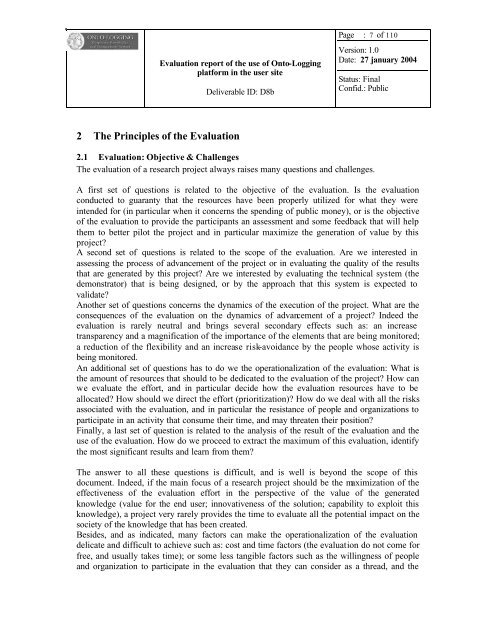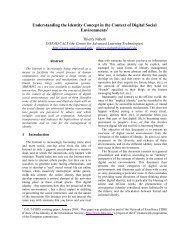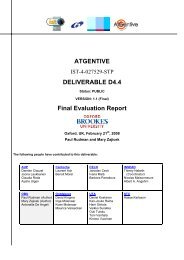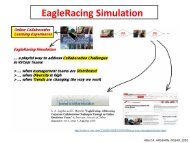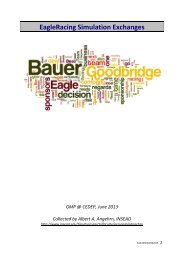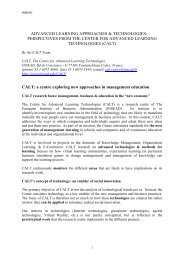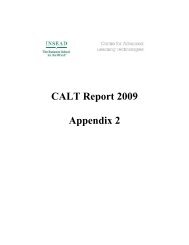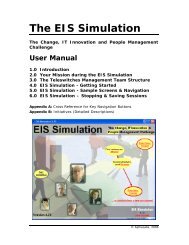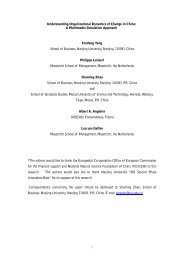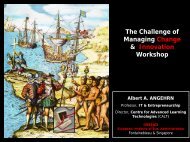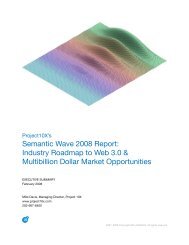pdf 820Kb - INSEAD CALT
pdf 820Kb - INSEAD CALT
pdf 820Kb - INSEAD CALT
You also want an ePaper? Increase the reach of your titles
YUMPU automatically turns print PDFs into web optimized ePapers that Google loves.
Evaluation report of the use of Onto-Logging<br />
platform in the user site<br />
2 The Principles of the Evaluation<br />
Deliverable ID: D8b<br />
Page : 7 of 110<br />
Version: 1.0<br />
Date: 27 january 2004<br />
Status: Final<br />
Confid.: Public<br />
2.1 Evaluation: Objective & Challenges<br />
The evaluation of a research project always raises many questions and challenges.<br />
A first set of questions is related to the objective of the evaluation. Is the evaluation<br />
conducted to guaranty that the resources have been properly utilized for what they were<br />
intended for (in particular when it concerns the spending of public money), or is the objective<br />
of the evaluation to provide the participants an assessment and some feedback that will help<br />
them to better pilot the project and in particular maximize the generation of value by this<br />
project?<br />
A second set of questions is related to the scope of the evaluation. Are we interested in<br />
assessing the process of advancement of the project or in evaluating the quality of the results<br />
that are generated by this project? Are we interested by evaluating the technical system (the<br />
demonstrator) that is being designed, or by the approach that this system is expected to<br />
validate?<br />
Another set of questions concerns the dynamics of the execution of the project. What are the<br />
consequences of the evaluation on the dynamics of advancement of a project? Indeed the<br />
evaluation is rarely neutral and brings several secondary effects such as: an increase<br />
transparency and a magnification of the importance of the elements that are being monitored;<br />
a reduction of the flexibility and an increase risk-avoidance by the people whose activity is<br />
being monitored.<br />
An additional set of questions has to do we the operationalization of the evaluation: What is<br />
the amount of resources that should to be dedicated to the evaluation of the project? How can<br />
we evaluate the effort, and in particular decide how the evaluation resources have to be<br />
allocated? How should we direct the effort (prioritization)? How do we deal with all the risks<br />
associated with the evaluation, and in particular the resistance of people and organizations to<br />
participate in an activity that consume their time, and may threaten their position?<br />
Finally, a last set of question is related to the analysis of the result of the evaluation and the<br />
use of the evaluation. How do we proceed to extract the maximum of this evaluation, identify<br />
the most significant results and learn from them?<br />
The answer to all these questions is difficult, and is well is beyond the scope of this<br />
document. Indeed, if the main focus of a research project should be the maximization of the<br />
effectiveness of the evaluation effort in the perspective of the value of the generated<br />
knowledge (value for the end user; innovativeness of the solution; capability to exploit this<br />
knowledge), a project very rarely provides the time to evaluate all the potential impact on the<br />
society of the knowledge that has been created.<br />
Besides, and as indicated, many factors can make the operationalization of the evaluation<br />
delicate and difficult to achieve such as: cost and time factors (the evaluation do not come for<br />
free, and usually takes time); or some less tangible factors such as the willingness of people<br />
and organization to participate in the evaluation that they can consider as a thread, and the


